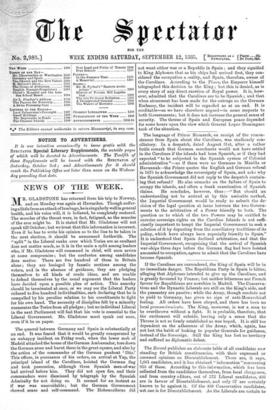The quarrel between Germany and Spain is substantially at an
end. It was feared that it would be greatly exasperated by an unhappy incident on Friday week, when the lower mob of Madrid attacked the house of the German Ambassador, tore down the German arms and burnt them in the great square, and also by the action of the commander of the German gunboat Iltis.' This officer, in pursuance of his orders, on arrival at Yap, the principal island of the Carolines, hoisted the German flag and took possession, although three Spanish men-of-war had aTrived before him. They did not open fire, and their commanders were dismissed by telegraph by the Spanish Admiralty for not doing so. It seemed for an instant as if war was unavoidable ; but the German Government showed sense and self-command. The Hohenzollerns did not want either war or a Republic in Spain ; and they signified to King Alphonso that as his ships had arrived first, they con- sidered the occupation a reality, and Spain, therefore, owner of the Carolines. According to the Times, the Emperor himself telegraphed this decision to the King ; but this is denied, as is every story of any direct exertion of Royal power. It is, how- ever, admitted that the Carolines are to be Spanish ; and that when atonement has been made for the outrage on the German Embassy, the incident will be regarded as at an end. It is creditable—as we have elsewhere argued—in some respects to both Governments ; but it does not increase the general sense of security. The throne of Spain and European peace depended for some hours upon the view which General Lopez Dominguez took of the situation.


































